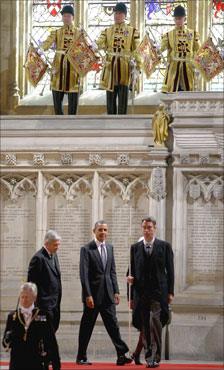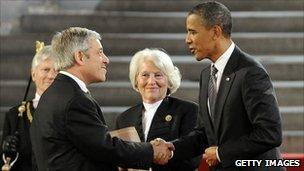Obama's historic speech fails to soar
- Published
- comments

Obama was the first president to speak in Westminster Hall
When I covered British politics I walked through Westminster Hall nearly every working day.
It is a place where you feel the weight of history. Dating from the 11th Century, English law was forged here. A king was sentenced to death here. Churchill and the Queen Mother lay in state here.
An ideal place, then, for an American president to talk about the link between Britain's past and the world's future.
But it didn't quite work. It was flat and lacked soaring passion. That is part of the Obama conundrum. Sometimes this tremendous orator doesn't pull it off.
It is often when the argument is over-constructed and the raw emotion can't burst through the stretched logic.
I was talking to a colleague beforehand about the eternal tension for broadcast journalists, whether to watch such a speech from an edit suite - which can make practical sense when time is short - or live, which we would all prefer.
He complained: "I'm not going to tell my grandchildren I watched Obama from a cutting room!"
I doubt this is a speech he will be talking to his grandchildren about all. But if it wasn't a defining speech, its relative failure is interesting.
This is the argument. Human rights and democracy came from England, said the president.
"Centuries ago, when kings, emperors, and warlords reigned over much of the world, it was the English who first spelled out the rights and liberties of man in the Magna Carta."
They were adopted by America, he continued.
"Perhaps no-one drew greater inspiration from these notions of freedom than your rabble-rousing colonists on the other side of the Atlantic. As Winston Churchill said, the …Magna Carta, the Bill of Rights, Habeas Corpus, trial by jury, and English common law find their most famous expression in the American Declaration of Independence."
America and Britain have stood together, forging freedom, in World War II, the Cold War and fighting terrorism, Mr Obama went on to say. But new powers have arisen in the world. So perhaps our time has passed.
"That argument is wrong. The time for our leadership is now. It was the United States and the United Kingdom and our democratic allies that shaped a world in which new nations could emerge and individuals could thrive. And even as more nations take on the responsibilities of global leadership, our alliance will remain indispensable to the goal of a century that is more peaceful, more prosperous and more just."
But the values forged in Britain and America are not Western values but universal rights, said the president.
"The future of our children and grandchildren will be better if other people's children and grandchildren are more prosperous and more free - from the beaches of Normandy to the Balkans to Benghazi. That is our interests and our ideals. And if we fail to meet that responsibility, who would take our place, and what kind of world would we pass on?"

Mr Obama was introduced by House Speaker, John Bercow
That to me is the key sentence: "Who would take our place?"
He doesn't spell it out, but it is a reminder many of the rising powers don't value democracy and human rights. Those that do may not have the desire to promote them in the muscular way that Britain and America can and do - at the point of a gun.
Looking back on Afghanistan, Iraq and Libya, some won't think that such a bad thing.
But here Mr Obama is nearer to a neo-con than the anti-war movement.
Mr Obama, who went on to talk about the strength of the UK and USA's "patchwork heritage", two nations based on values not ethnicity, can get away with this. From an old white man it would have sounded like colonial arrogance.
He got near to the heart of the argument about the way the USA and its allies behave in the world, but he didn't quite make it all the way.
This felt like an attempt to mix too many elements. Flattering Britain, promoting the essential relationship, American exceptionalism, Britain's role in creating it, universal values.
They were all there, but like oil and water stayed stubbornly apart.
It is perhaps the most important argument in the world today. I want to hear more.